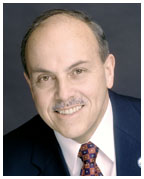|
Web Exclusives: Alumni Spotlight May 9, 2007:
PROFILE: Ricardo Fernández *70 After Ricardo Fernández *70 earned his doctorate in Romance languages and literatures at Princeton, he thought he would spend his career teaching Spanish. But he stayed only two years in his first position, as an assistant professor at Marquette, before the University of Wisconsin hired him as the first director of the Spanish-Speaking Outreach Institute, aimed at recruiting more Hispanic students to campus. That appointment would turn out to be a turning point in his career. Since then he has focused on narrowing the achievement gap between white students and minority students, particularly Hispanics. Fernández, who was born and raised in Puerto Rico, established stronger connections between the University of Wisconsin–Milwaukee and the city’s public high schools and the Hispanic community, including the creation of an outreach office that offered information on college and financial aid. Those efforts led to an increase in the number of Hispanic students at Wisconsin, from 50 out of 20,000 students in 1970 to about 450 out of about 22,000 when he left in 1990. While there, he also conducted research on dropout rates among Hispanics in high school. The ASPIRA Association, a Hispanic youth organization, used his study to design projects, including the Hispanic Community Mobilization for Dropout Prevention, which helped parents to become more effective participants in and advocates for their children’s education. It seemed a natural evolution that his research on and work in recruiting Hispanic students led him to the Bronx’s Lehman College of the City University of New York, where nearly half the student body is Hispanic. Fernández describes Lehman, one of the colleges in CUNY, as “the only game in town” for many of its students. “If they don’t go to CUNY, it is likely they’re not going to go to college.” Since becoming Lehman’s president in 1990, he has fostered collaboration between the college and local elementary, middle, and high schools in the areas of technology, the arts, and professional development, while offering local residents a place to attend arts and science events. He sees the college as a cultural beacon for the Bronx — a way to improve the community by creating avenues to education. In February Fernández took over as chairman of the American Council on Education, which he describes as the “voice of higher education in Washington.” ACE influences public policy through advocacy, research, and programs. Fernandez, who remains president of Lehman, will be involved in the search for a new president of ACE and in expanding its recently launched “KnowHow2Go” program, which provides information for low-income and first-generation students on how to prepare for college. He also will monitor the reauthorization of the Higher Education Act, which is before Congress, to make sure it adequately funds federal financial aid programs and other programs aimed at helping students to complete high school and to enter and succeed in college. Says Fernández, “There are significant ways in which educational
institutions can be designed and operated to help level the playing field and
let more people into the competition, and enable them to succeed.” By Kerry Lynn Saretsky ’05 Kerry Lynn Saretsky ’05 is a writer in New York City.
|
||

